5 citations,
January 2012 in “Journal of nutrition & food sciences” The supplement improved hair, skin, and nails appearance and had long-term benefits.
 5 citations,
December 1942 in “Journal of the American Medical Association”
5 citations,
December 1942 in “Journal of the American Medical Association” Choline and biotin are important for liver health and preventing certain deficiencies in animals, and more research is needed to understand their benefits in humans.
 3 citations,
December 2001 in “Irish Journal of Psychological Medicine”
3 citations,
December 2001 in “Irish Journal of Psychological Medicine” Trichotillomania is a challenging-to-treat impulse-control disorder where individuals pull out their hair, more common in females, with some treatments showing benefits.
 2 citations,
July 2022 in “PubMed”
2 citations,
July 2022 in “PubMed” Coconut oil helps with brittle hair and infestations, castor oil may improve hair shine, and argan oil lacks evidence for hair benefits.
 1 citations,
June 2023 in “Ethnobotany research and applications”
1 citations,
June 2023 in “Ethnobotany research and applications” The review concludes that the Ziziphus species, especially jujube, may promote hair growth and have various health benefits, warranting more research.
 1 citations,
January 2023 in “Przegla̧d dermatologiczny”
1 citations,
January 2023 in “Przegla̧d dermatologiczny” Zinc may be linked to vitiligo development and severity, but its role is not fully understood and zinc supplementation benefits are unclear.
 1 citations,
May 2021 in “Revista Eletrônica Acervo Científico”
1 citations,
May 2021 in “Revista Eletrônica Acervo Científico” The document concludes that more research is needed on treatments for hair loss in both men and women, especially on medication combinations and their benefits.
 1 citations,
January 2020 in “Journal of quality in health care & economics”
1 citations,
January 2020 in “Journal of quality in health care & economics” Most Sudanese married women in the study used contraceptives and knew about them, but many didn't know about emergency contraceptives or extra benefits beyond family planning.
1 citations,
March 2009 in “China Journal of Chinese Matera Medica” Procyanidins may have antioxidant, heart health, cancer-fighting, anti-inflammatory, anti-diabetic, liver-protective, and other health benefits with high efficiency and low toxicity.
 April 2024 in “Pharmacognosy research”
April 2024 in “Pharmacognosy research” The herbal hair dye with natural ingredients like henna was successfully made and tested, but more research is needed on its effectiveness on different hair colors and benefits.
 May 2023 in “Endocrine, metabolic & immune disorders”
May 2023 in “Endocrine, metabolic & immune disorders” Hibiscus rosa-sinensis is used in traditional medicine and is safe in high doses, with various health benefits.
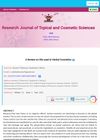 December 2022 in “Research journal of topical and cosmetic sciences”
December 2022 in “Research journal of topical and cosmetic sciences” Herbal cosmetics with oils like olive, coconut, and almond are popular for their skin and hair benefits with few side effects.
 January 2022 in “International journal of pharmaceutical sciences review and research”
January 2022 in “International journal of pharmaceutical sciences review and research” Herbal cosmetics are becoming more popular because they are safer, have fewer side effects, and offer health benefits.
 May 2021 in “Boletín latinoamericano y del Caribe de plantas medicinales y aromáticas”
May 2021 in “Boletín latinoamericano y del Caribe de plantas medicinales y aromáticas” Microsechium helleri extract has antioxidant, anti-inflammatory, antidiabetic, and heart-protective benefits.
 May 2019 in “Australasian Journal of Dermatology”
May 2019 in “Australasian Journal of Dermatology” The conclusion is that managing hair loss conditions like FFA and melanoma requires individualized approaches, considering new findings and balancing treatment benefits with potential risks.
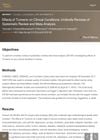 September 2018 in “Value in Health”
September 2018 in “Value in Health” Turmeric can improve knee arthritis, depression, and metabolic syndrome, but more large-scale trials are needed to confirm these benefits.
August 2018 in “Journal of the American Academy of Dermatology” Biotin treatment for hair, nail, and skin disorders has weak evidence and should not be recommended unless new research shows clear benefits.
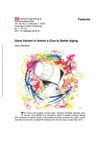 January 2018 in “Genetic engineering & biotechnology news”
January 2018 in “Genetic engineering & biotechnology news” A genetic mutation linked to longer life and less disease was found in the Amish, and a drug is being developed to replicate these benefits.

Researchers improved mouse skin cell culture methods and created a similar immortal cell line, but need to clarify their methods and benefits.
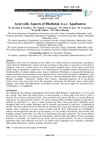 August 2017 in “International journal of Ayurvedic and herbal medicine”
August 2017 in “International journal of Ayurvedic and herbal medicine” Bhallataka is a poisonous plant that, when detoxified, may have medicinal benefits for various health issues.
 December 2014 in “Annals of psychophysiology”
December 2014 in “Annals of psychophysiology” Power-enhancing drugs can cause mood swings, aggression, anxiety, and physical side effects, questioning their overall benefits.
 September 2014 in “International Journal of Dermatology and Venereology”
September 2014 in “International Journal of Dermatology and Venereology” Certain histamine receptors (H2R, H3R, H4R) have unique roles in treating skin diseases, with H2R helping with chronic urticaria and other conditions, H3R providing pain relief and allergy benefits, and H4R reducing inflammation and itchiness.
 March 2014 in “CRC Press eBooks”
March 2014 in “CRC Press eBooks” Some nutrients and antioxidants may improve skin and hair health, but more research is needed to confirm these benefits.
 February 2012 in “Community oncology”
February 2012 in “Community oncology” The document concludes that accurately identifying leukemia types is crucial, and the risks of cancer from finasteride need careful evaluation against its benefits.
 January 2007 in “Inpharma Weekly”
January 2007 in “Inpharma Weekly” Dutasteride is more effective for male pattern baldness than finasteride, and black cohosh extract BNO 1055 is as effective as conjugated estrogens in treating postmenopausal symptoms, with added benefits in reducing sweating and mental symptoms.
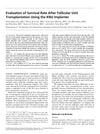 August 2001 in “Dermatologic Surgery”
August 2001 in “Dermatologic Surgery” The KNU implanter for hair transplants showed a high survival rate of 90%+ for transplanted hairs after 6 months, with benefits like natural hair direction and fewer scars.
 March 2023 in “International Journal of Advanced Research in Science, Communication and Technology”
March 2023 in “International Journal of Advanced Research in Science, Communication and Technology” Various medicinal plants like Polygonum multiflorum, Red ginseng extract, and Zizyphus jujuba can potentially treat hair loss, offering benefits like low cost and multiple ways of working. Other effective natural substances include Pygeum africanum, Seneroa, Urtica dioica, and more.
 May 2017 in “Journal of The American Academy of Dermatology”
May 2017 in “Journal of The American Academy of Dermatology” Finasteride 1 mg/day effectively treats hair loss in men aged 18-41 and over 41; DEET lotion works better than herbal insect repellents; combined tattoo removal technique shows no extra benefits.
 June 2010 in “Chin J Postgrad Med”
June 2010 in “Chin J Postgrad Med” Using prednisone, zinc, and minoxidil together effectively treats hair loss with long-term benefits and is safe to use.
 2 citations,
March 2004 in “Reviews in Gynaecological Practice”
2 citations,
March 2004 in “Reviews in Gynaecological Practice” Hormonal changes and psychological issues can cause sexual dysfunction in postmenopausal women. Behavioral therapy is recommended first, with hormone replacement helping some symptoms but not libido. Testosterone can improve libido, but its effects on overall sexual function are unclear. Emotional and relationship issues should be addressed before using medication, and the benefits and risks of testosterone supplementation should be considered.


























